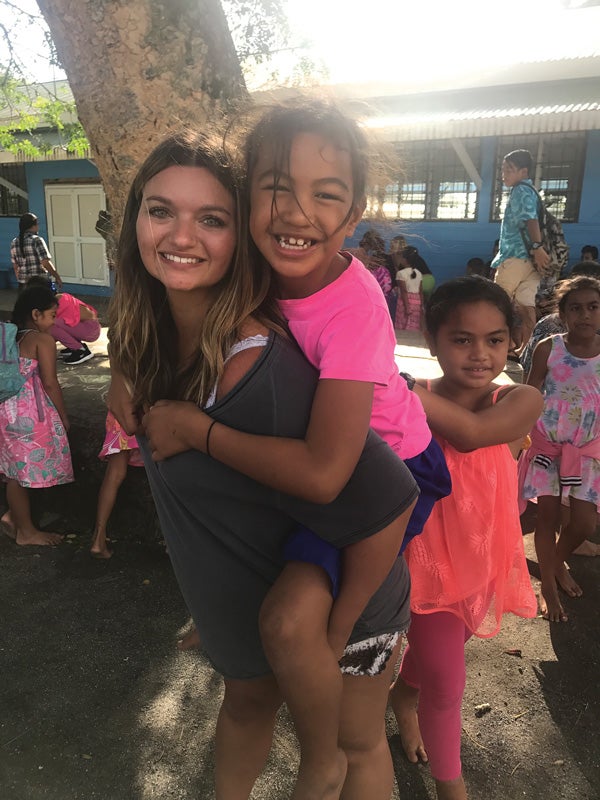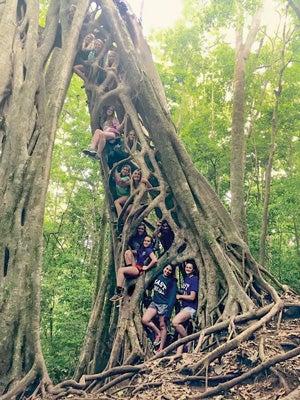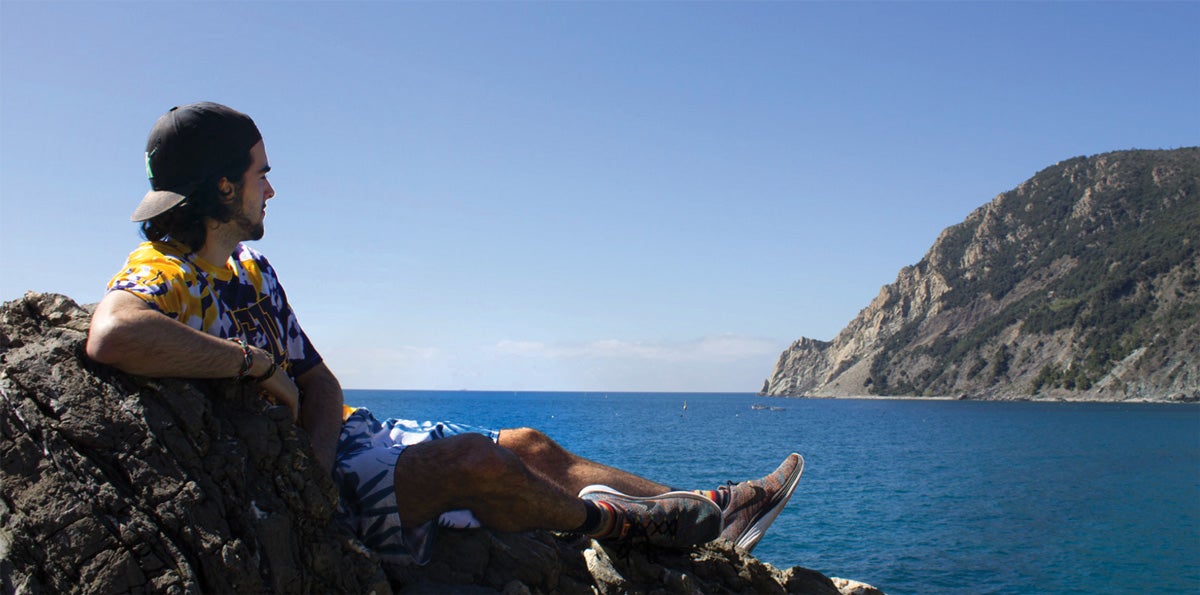Pirates Abroad
Students travel the globe with international programs
You could call it a form of distance education when Ashlyn Biggers recently took a semester’s worth of classes in art, Italian, literature and art history—distance education in that she took the courses in Italy. “We were surrounded by the Chianti hills and olive orchards,” says Biggers, who took part in the Italy Intensives program in the small Tuscan town of Certaldo Alto. “It was challenging for sure but well worth it. I retained so much and learned so many skills that wouldn’t be possible in a standard university classroom setting.”
Each year more than 500 students leave East Carolina University’s campus – and the country – to experience life abroad while continuing their studies and participating in unique learning opportunities through study abroad programs.
Chancellor Cecil P. Staton, who describes his own study-abroad experience as a defining point in his life, is encouraging even more Pirates to travel abroad and promoting a renewed focus on international programs.
Nationally, about one in 10 undergraduate students participates in a study-abroad program before graduating, according to figures from the Institute of International Education.
“Students get a different perspective on both life and on their career field or major, and they broaden their skill set,” says Katie Erickson, assistant director for education abroad. “They also gain confidence in themselves because they really have the chance to be independent.”
Jon Rezek, executive director for global affairs, says many students return to campus more mature and focused. “The benefits of studying abroad are particularly strong for students who haven’t experienced other cultures,” he says. “It can be a transformative experience.”
ECU offers some 200 programs in more than 60 countries. Top destinations include Italy, the United Kingdom, Spain and Australia, but programs are offered on nearly every continent. Botswana, Costa Rica, China, Thailand, Germany and Canada are all on the list.
Some are exchange and consortium programs offered in partnership with other universities, in which the student travels independently to the host country and takes courses taught by faculty at the partner institution. Others are faculty-led programs in which the student travels with an ECU faculty member and other ECU students.
One example of the latter is the Italy Intensives program, which is the only faculty-led program conducted every semester and summer. It offers coursework in the humanities, social science, English, science and fine arts and includes excursions to Rome, Venice, the Amalfi Coast, Pompeii, Florence and Cinque Terre.
Like the other study-abroad programs at ECU, it focuses on learning as well as travel and the experience of foreign cultures.

Senior psychology major Haley Jamrog is shown with children at the Avarua Primary School in Rarotonga, Cook Islands.
“Instead of learning by seeing digital images on a screen in a classroom, our students walk through art history with classes on site in museums, cathedrals and monuments,” says Linda Darty, director of Italy Intensives. “Our geology students hike the trails of Cinque Terre to study coastal processes and erosion, and world history classes explore Pompeii, the Roman Forum and the Colosseum.”
Biggers, an art major, says the cultural immersion was inspiring.
“I left feeling like I was leaving a second home,” she says. “The difference in lifestyle and pace struck a chord within me that made me yearn to adapt and incorporate the Italian way into my routine back home.”
Alyssa Martinez, who studied abroad in Italy last fall, says the experience opened her eyes to how much she could learn from other cultures, histories and people.
“Being immersed in the Italian culture and partaking in their lifestyle was a life-changing experience that helped me to grow both as an individual and in my academics,” she says.
Gary Lavenia participated in an exchange program in Paris, living with a host family and studying the language and culture in the French capital.
“The French department at ECU is fantastic, which is why I was prepared for this,” he says. “That being said, there is no way I could have experienced this in America.”
Some programs are service-learning oriented, such as the College of Nursing’s program in Guatemala. Students live with Guatemalan families and participate in family and community activities while learning how care is provided in regions where people have limited access to health services.
One of the obstacles to increasing study abroad participation is the perceived cost, says Rezek, but depending on the program, the expense can be similar to or not much greater than tuition and expenses in Greenville. There are also scholarships available.
“It actually was cheaper for me to study abroad than to stay in Greenville paying rent, utilities, groceries and textbooks on top of tuition,” says Martinez. “This was the best decision I ever made and it has encouraged me to live abroad once I graduate.”
The Harold H. Bate Foundation is one of a number of organizations and individuals who provide financial support for international programs. Two recent grants totaling $100,000 provide opportunities for students from rural eastern North Carolina counties to spend a semester abroad.

Student Jessica Emerine and friends climb vines in Costa Rica.
Mary Grace Lee, majoring in biology and Hispanic studies, hopes to become an immunologist and understands the importance of being able to communicate with Spanish speakers. A Bate Foundation scholarship helped fund her summer studying in Granada, Spain, which was her first trip outside the United States.
“I have taken Spanish classes for about six years now, including high school, and was never comfortable speaking it until I had to while living in Spain,” she says. “My vocabulary expanded as well as my knowledge and understanding of the different tenses and grammatical points. This trip truly changed my life.”
Some students may be hesitant to leave behind the familiar, says Whitney Morris, coordinator of faculty-led study abroad programs.
“They may come from families that aren’t used to traveling a lot,” she says. “We usually have at least one student a semester who’s never been on a plane before. Many are applying for a passport for the first time.”
Those may be the students that benefit the most from the experience, says Rezek. That’s why there’s a team of global ambassadors — students who have returned from studying abroad who encourage their fellow Pirates to participate and help guide them through the application and advising process.
Public health studies major Nick Livingston says he learned about studying abroad from a friend.
“I would have never known about it if it were not for her,” he says. “I had never been overseas before, so it was definitely a novel experience.
In our society, everything is so fast-paced and we are prone to miss the little things in life that can have the biggest impact. It was crazy coming back to ECU’s campus and riding a bus, only to look around and see every passenger enamored with their cell phone.”
Wherever they go and whatever they study, students gain from the experience, says Erickson. “A lot of times they’ve learned something about who they are and what they want to do,” she says.

Ian Flynn looks over the Gulf of Genoa from Cinque Terre, Italy

